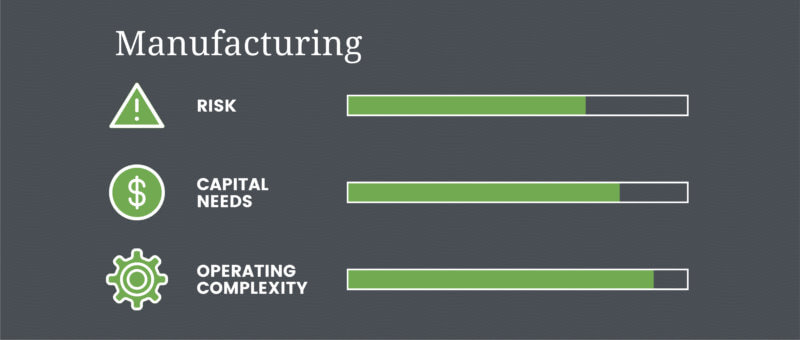Manufacturing
In Cannabis Processing, Planning Turns Risk into Reward
Cannabis manufacturing is the ultimate in “high risk, high reward” endeavors. The potential profit margins in manufacturing are substantially larger than in other parts of the industry, but the sector’s complexity makes it a true logistical puzzle. Cannabis manufacturers must plan for extraction, formulation, and packaging — each with its own unique set of questions and challenges.
Cannabis manufacturing is like operating three separate businesses at once.
When attempting such a complex business endeavor, entrepreneurs must start with extremely detailed plans and procedures for a clear path forward and the right guidance in order to succeed. Wholesale operations must also be sales-driven to succeed.
Contact our team to start developing business and financial plans, facility designs, equipment lists, quality and inventory control plans, packaging and training plans, and SOPs.
Begin at the End in Cannabis Manufacturing
Product
What are you making? This might seem like an obvious question, but the answer informs every other decision in your planning process, from capital needs and staffing to facility layout and equipment. Primary product categories include crude oil, infused products, and concentrates. Within those categories are common products like edibles, topicals, tinctures, beverages, and vape pen cartridges, as well as lesser-known options such as resin, shatter, and hash. Deciding on your product niche requires assessing your unique capabilities, your available resources, and the trends and demands of the market.
Process
Your product choices will lead you toward the process and equipment you need, but there are many details to consider. For example, CO2 and hydrocarbon are the two most common extraction methods, but there is a tradeoff between the two. Hydrocarbon machines have a lower cost, but require a Class 1 Division 1 (C1D1) explosion-proof room. CO2 extraction doesn’t require a C1D1 room, but the equipment for this method is more expensive.
Depending on your end product, you may also need to consider post-processing equipment for distillation and refinement, or product formulation machinery like commercial kitchenware for edibles.
Packaging
Packaging your product might initially seem like a minor detail, but cannabis packaging actually carries two enormous burdens. The first is compliance which requires strict adherence to regulations (which can differ widely from one state or locality to another), child-proofing, and accurate labeling. The second is marketing. If you’re selling as a branded product, packaging is often your primary touchpoint with potential consumers. Your packaging needs to stand out and communicate your brand identity, all while still meeting those compliance requirements. Even if you’re a white-label manufacturer, selling to dispensaries for branding and resale, your packaging designs will still be critical in presenting your product effectively.
Is Cannabis Manufacturing Your Best Business Fit?
Determine your tolerance level for the most complex cannabis business type

The graphic above gives a general representation of the risks, capital needs, and operating complexity of a cannabis manufacturing business. These specific factors may vary depending on your business vision and state regulations.
Major Manufacturing Matters
As the most complex sector of the cannabis industry, potential manufacturers must have a firm grasp on a myriad of challenges, from intricate processes and equipment systems all the way down to large-scale questions of distribution and real estate. Here are some of the top considerations for cannabis processors:
- Staffing - Cannabis processing is highly specialized and requires a competent, diverse team of experts in extraction and formulation. Prior experience is mandatory for cannabis manufacturing start-ups. There is too much money and time at stake to risk hiring inexperienced team members.
- Equipment - Machinery is a significant investment for a cannabis manufacturing business. The size and quantity of machinery that you need is highly dependent on how much processing you expect to do on a weekly and monthly basis. Be sure to think through redundancy as well. Backup plans are crucial to keep workflow on track and minimize production loss if a machine breaks or a part needs to be ordered.
- Testing - Recalls and other product safety issues can sink a cannabis manufacturing business. Internal testing and quality assurance protocols can identify problems before they reach a third-party lab or dispensary shelves -- saving you time, money, and reputation.
- Distribution Channels - Manufacturers are right in the middle of the supply chain, which doubles your work on developing industry relationships. To ensure quality and consistent raw material supplies, you will need strong relationships with cultivators. To get your products in the hands of consumers, maintaining dispensary connections and training dispensary employees on your product are vital for growing your brand.
- Real Estate - Beware of committing to a property before thoroughly researching the zoning and regulations of your target municipality. Your business location must be properly zoned and have city approval, or you won’t get a license to operate. Building community support for your business also plays into the real estate equation. Assuring your community that you are operating in a safe, compliant, and acceptable manner plays a major factor in local approvals.
Detailed planning is the key to navigating the complexities of cannabis manufacturing. Canna Advisors will smoothly guide you through the initiation of your manufacturing business and build your team’s expertise to handle every twist and turn along the way.
Extensive Planning is the Key to Manufacturing Success
Start Formulating Your Cannabis Manufacturing Business